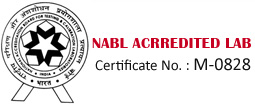HCV Genotype Method Nested Reverse Transcriptase PCR
Home /
HCV Genotype Method Nested Reverse Transcriptase PCR
Interpretation:-
This test is an in-house? developed test for detection of Hepatitis C virus genotypes 1,2,3,4,5 and 6 in clinical specimens using RT-PCR & Sequencing method. The primers and probe used in this assay are located in the most conserved domains within 5'UTR of HCV genome. An internal control is co-extracted and co-amplified in every sample to monitor inhibition; inherent inhibitors in clinical samples inhibit PCR amplification and cause false negative results; the inclusion of an internal control distinguishes false negative and true negative results
Limitations: A negative result for HCV may be seen if the number of viral RNA copies in the sample are below the detection limit of the assay i.e. 33.6 IU/mL
METHOD : NESTED REVERSE TRANSCRIPTASE PCR
Test Method(s)
HCV GENOTYPING Clinical Utility: Worldwide nine major HCV genotypes are known. This test is designed to detect four clinically relevant HCV genotypes (i.e. HCV type 1,2,3 & 4). Patients infected with HCV genotype 1 usually have elevated ALT, higher viral load, and more severe liver damage. These groups of patients respond poorly to therapy and are most likely to progress to cirrhosis.
Method: Nested RNA Polymerase Chain Reaction
Interpretation: Different HCV genotypes yield unique amplification band after nested RT-PCR.
Non-typeable results could be obtained due to one of the following reasons:
1)HCV viral load is very low(generally below 6,000 copies /ml).
2)HCV sequence divergence preventing amplification primers from hybridizing(generally due to mutations).
If the diagnosis of Hepatitis C Virus infection has been clearly established in the patient, the test for HCV detection by PCR followed by genotyping could be repeated after a suitable period of time. However, this test is not meant for screening of HCV infection. In patients infected by more than one HCV genotypes, one genotype may prevail as the viremic virus and detected by HCV genotyping. Upon initiation of the therapy; the displaced genotype may replace the earlier viremic strain thereby yielding different HCV genotypes during serial testing.
Limitations: PCR is a highly sensitive technique; common reasons for paradoxical results are contamination during specimen collection, selection of inappropriate specimens and inherent PCR inhibitors in the specimen.



